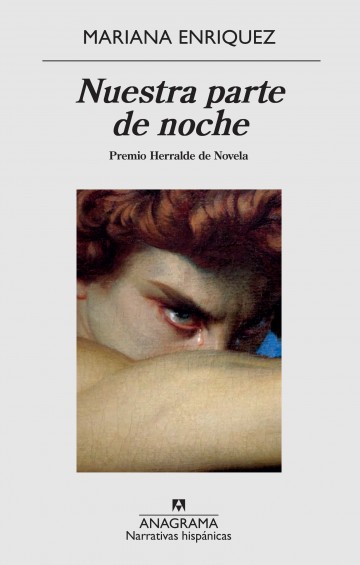
Jordi Labanda for “Cultura/s,” La Vanguardia, Dec. 21, 2019: ‘Christmas Books’
The original Christmas story is told in Luke 2. You can find it in your language here.

Jordi Labanda for “Cultura/s,” La Vanguardia, Dec. 21, 2019: ‘Christmas Books’
The original Christmas story is told in Luke 2. You can find it in your language here.

Jordi Nopca, La teva ombra [Your shadow], 2019, 512 p.
1st Proa novel prize
publisher’s summary:
The lives of the two brothers who are the protagonists of La teva ombre flow in parallel, sometimes like two rivers, sometimes like two cars in opposing directions. In the summer of 2010 Pere, 25 years old, who lives with his parents in Barcelona, keeps busy with electronic music, the project of a website on entertainment and culture, and the sexual encounters with Kate, a mysterious English violinist. But he can’t get his ex-girlfriend Laura out of his head. Meanwhile his older brother Joan, a voracious reader who works as a primary school teacher, leads a secret life that will completely affect him.
La teva ombra is an ambitious novel on personal identity in our time that combines drama and irony in a brilliant manner.
Jordi Nopca (Barcelona, 1983) is a writer and journalist.
The critic Julià Guillamon has pointed out that this novel might be too long; and it is interesting that the publisher offers such a short summary. Guillamon compared the novel to other recent ones by accomplished young writers, e.g. Marta Rojals and Llucia Ramis, who maybe put too much stuff into one single work.
This blogger likes the mentioned writers and might read this novel, too. He hates the cover that shows a smoker, similar to that of Javier Marías’ Berta Isla…
There is a 2015 post on an earlier novel by Nopca that will be published in English, too, according to the publisher.
SOURCE: Proa (Grup 62, Planeta, publisher)
On 10 December 1919, Marcel Proust was awarded the Goncourt prize for his novel A l’ombre des jeunes filles en fleur [In the Shadow of Young Girls in Flower], the second of his seven-volume In Search of Lost Time (1913-1927).
The Wikipedia has got articles on the Prix Goncourt, the author Marcel Proust, and on his À la recherche du temps perdu.
Proust is one of the many writers this blogger still has on his “to do” list…

Mariana Enríquez, Nuestra parte de noche [Our part of the night], 2019, 680 p.
Herralde novel prize 2019
publisher’s summary:
A father and a son cross Argentina by road, from Buenos Aires to the Iguazú falls, on the northern border with Brazil. These are the years of the military junta, there are controls by armed soldiers and there is tension in the air. The son is called Gaspar, and the father tries to protect him from the fate that has been assigned to him. The mother died in uncertain circumstances, in an accident that perhaps was none.
As his father, Gaspar is called to be a medium in a secret society, la Orden [the order], that makes contact with the Darkness in search of eternal life through atrocious rituals. For them it is of vital importance to have a medium, but the fate of these beings –that are equipped with special abilities– is cruel, because their physical and mental wear is quick and relentless. The origins of la Orden, ruled by the powerful family of Gaspar’s mother, go hundreds of years back, when the knowledge about the Darkness arrived from the heart of Africa in England and from there extended to Argentina.
The readers will find in these pages houses whose interiors mutate; passageways that hide unimaginable monsters; rituals with wild and extatic human sacrifices; walks in the psychodelic London of the 1960s, where Gaspar’s mother got to know a young singer of androgynous air called David; human eye lashes turned into fetishs; enigmatic sexual liturgies; the relationship between parents and children, with the load of an atrocious inheritance; and in the background the repression of the military dictatorship, the disappeared, and later on, the uncertain arrival of democracy, the first HIV cases in Buenos Aires… Supernatural terror crosslinks with very real terrors in this disturbing and dazzling novel that proves Mariana Enriquez’ status as one of the fundamental Latin American writers of the 21st century.
This blogger stumbled upon the title because of the Herralde prize which carries a certain prestige. The summary sounds too “gothic” to kindle his interest in reading the book…
There is an older post on Enriquez from 2018. And a Wikipedia article.
SOURCE: Anagrama (publisher)